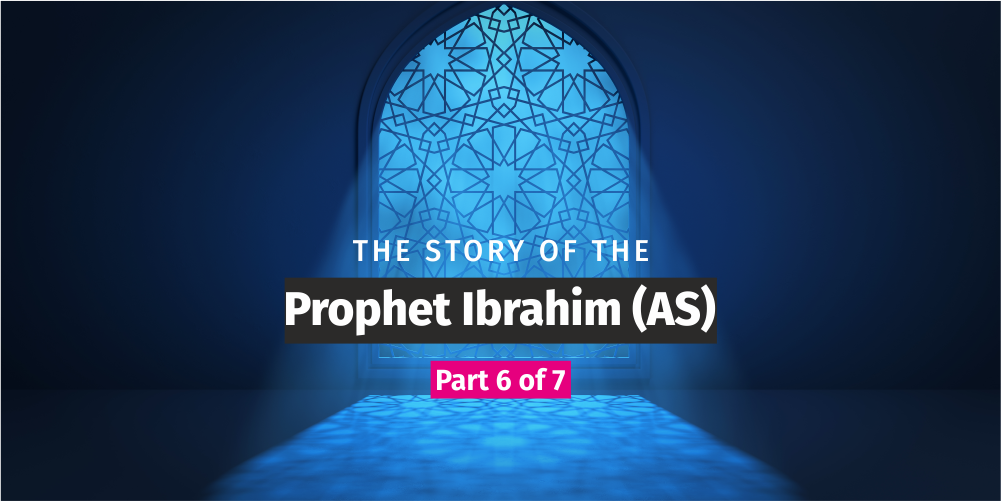
Ibrahim (as) is to undergo one of his hardest tests yet. He must sacrifice his only son, whom he loved so dearly. But the command from Allah (swt) has to be fulfilled. He asks his son what to do. Read on in Part 6 to find out what happens.
Ibrahim (as) with his son Ismail (as) builds Al-Ka'bah, the most sacred building on Earth, and the centre of worship for all Muslims worldwide.
The dreams of the Prophets are considered to be revelations from Allah (swt). Unlike our dreams, the dreams of the Prophets are a form of guidance and instruction to them. Many times, Prophet Muhammad (saw) would see certain things in a dream, and they would instruct him to do something. These were divine instructions from Allah (swt).
Ibrahim (as) saw in a dream that he was sacrificing Ismail (as). He knew that this was a command from Allah (swt). As a devout Muslim, Ibrahim (as) could not imagine defying Allah (swt). In the Qur'an, this story is mentioned:
"My Lord! Bless me with righteous offspring.” So We gave him good news of a forbearing son. (Surah As-Saaffaat)
Ibrahim (as) did du'a for a son as he had no children, and Allah (swt) blessed him with one. Then he had to leave his beloved son in a barren valley, and he did that. The Qur'an continues:
Then when the boy reached the age to work with him, Ibrahim said, “O my dear son! I have seen in a dream that I {must) sacrifice you. So tell me what you think.” He replied, “O my dear father! Do as you are commanded. Allah willing, you will find me amongst the patient ones.” (Surah As-Saaffaat)
Ibrahim (as) knows that he must sacrifice his only son, but instead of just doing it, he tells Ismail (as). Ismail (as) being the son of one of the most devout people in the history of mankind, was also a strong, and devout Muslim. He also had trust and a firm belief in Allah (swt). He showed that the commands of Allah (swt) cannot be disobeyed and that the one who throws themselves into difficulty for the sake of Allah (swt) will never be neglected. So he instructs his father to do as he was instructed.
Ibrahim (as) and Ismail (as) make their way to the place of sacrifice. As servants of Allah (swt), they know they must do what was commanded to them, even if they don't want to do it. This is the principle of submission that Allah (swt) is teaching us about.
Along the way, Shaytan comes towards Ibrahim (as). He knows that deep down, Ibrahim (as) would never want to harm his only son, let alone sacrifice him. Ibrahim (as) knows that Shaytan only wishes to deceive him, so he pelts him with some stones until Shaytan withdraws. Then a second time, Shaytan appears, and Ibrahim (as) pelts him again. Shaytan appears for the third time, and Ibrahim (as) pelts him yet again. After that, Shaytan does not appear again.
Allah (swt) continues in the Qur'an mentioning the story:
Then when they submitted (to Allah’s Will), and Ibrahim laid him (Ismail) on the side of his forehead (for sacrifice). We called out to him, “O Ibrahim! You have already fulfilled the vision.” Indeed, this is how We reward the good-doers. That was truly a revealing test. And We ransomed his son with a great sacrifice, and blessed Ibrahim (with an honourable mention) among later generations. “Peace be upon Ibrahim.” This is how We reward the good-doers. He was truly one of Our faithful servants. (Surah As-Saaffaat)
Just as Ibrahim (as) was about to sacrifice Ismail (as), Allah (swt) commanded Jibreel (as) to replace Ismail (as) with a ram. The ram was slaughtered and Ismail (as) was not harmed. This was a miracle from Allah (swt) and a great test. It proved the obedience of Ibrahim (as) and his son Ismail (as) to the command of Allah (swt).
Allah (swt) mentions in these verses that He blessed Ibrahim (as) (with an honourable mention) among later generations. There are many ways in which we honour Ibrahim (as). We can see that in this series, many of the acts of Hajj are derived from the actions of Ibrahim (as). We also mention the name of Ibrahim (as) and his family when we recite Durood Ibrahimi in our Salah.
For three days during Eid-Ul-Adha, it is an emphasised Sunnah to recite Tasbeeh Tashreek:
اللَّهُ أَكْبَرُ اللَّهُ أَكْبَرُ لَا إلَهَ إلَّا اللَّهُ وَاَللَّهُ أَكْبَرُ اللَّهُ أَكْبَرُ وَلِلَّهِ الْحَمْد
When Ismail (as) was replaced with a ram and then slaughtered, the Angels who were present exclaimed: "Allahu akbar, Allahu akbar! (Allah is the Greatest, Allah is the Greatest)". When Ibrahim (as) noticed that he had sacrificed a ram instead of his son, he exclaimed: "Laa ilaaha illAllahu, wAllahu akbar (there is no God but Allah, and Allah is the Greatest)". When Ismail (as) noticed what had happened and that he had not been sacrificed, he exclaimed: "Allahu akbar, wa lillahil-hamd (Allah is the Greatest, and to Him is due all Praise)".
Here are a few important lessons that we can learn from the story of Ibrahim (as) from this part of his life:
This post is part of a series of posts. You can skip to the other posts by clicking on any of the parts below:
Part 1 | Part 2 | Part 3 | Part 4 | Part 5 | Part 6 | Part 7